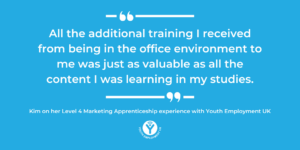Social Media Coordinator careers guide and job profile
Want the power to influence people by weaving creative storytelling and creating a community? A career as a Social Media Coordinator could be for you!
Getting into Social Media Coordinator careers
How much money can you earn as a Social Media Coordinator?
These LMI Job Trends give you a sneak peek of how much you could earn starting out for this career, and how much your salary could grow with experience.
Average salary for marketing jobs
Recent labour market information says you can earn on average between £16,000 and £50,000 a year as a Social Media Coordinator in the UK.
Your starting salary can vary because of factors like level of experience, training, location or the size of the company. Your salary as a Social Media Coordinator will increase over time as you build skills, knowledge, and experience.
Sales, Marketing & Procurement Career FAQs & Insights

Is there something you’d like to know about Sales, Marketing & Procurement careers?
Skills you need to become a Social Media Coordinator
Useful skills to put in your CV:
- Written communication skills – you’ll often use a combination of words (aka copy) and imagery (videos and GIFs can capture attention) to get your message across in an engaging way. You’ll take care to remove any pesky typos or broken links before a post goes live (this needs attention to detail!). There’s nothing worse than a post going viral with that one glaring typo staring you in the face.
- Problem solving skills and an curious mind – what steps would you take to make sure an employer gets as many website visits as possible from a social media campaign?
- Organisation skills – you’ll often be working to tight deadlines, and sometimes for a number of clients – especially if you’re working in a marketing agency which handles social media accounts for clients
- Teamwork skills – you’ll be working as part of a team, supervised by a social media manager.
- Self-management skills – you’ll use your initiative to offer ideas for social content, and contribute to team meetings. You’ll be able to get on with your work without a team leader always telling you what to do.
- It goes without saying that you’ll be passionate about social media and the possibilities it offers to build relationships with brands and audiences
- Digital skills – to be able to use a computer and the main software packages confidently
Top Skills-boosting Tip
Keep up with marketing trends! New features, apps and trends are appearing all the time and you don’t want to be late to the party. Look at how big TikTok is and how jumping onto a viral trend can boost your brand awareness and visibility!
You could keep up to date by joining webinars about social media trends.
How Do You Get These Skills?
Vocational qualifications and work experience will help you build these skills over time.

Build Your Skills With the FREE Young Professional Programme
What Qualifications & Training Do You Need For Marketing Careers?
Training
You could do qualifications through professional bodies like the Institute of Data and Marketing and The Chartered Institute of Marketing to build your skills, knowledge and experience in marketing.
BTECs
As an alternative to A-Levels, you can do BTECs from the age of 16. There are a number of BTEC subjects you might want to consider if you are interested in becoming a Social Media Coordinator. Courses available could include:
- Marketing and Social Media Level 3 BTEC
- BTEC Level 3 National Extended Certificate in Marketing
- BTEC Level 5 Higher National Diploma in Business (Marketing)
Courses available can vary across schools, colleges and sixth forms and across training providers.
You’ll normally need 2 or more GCSEs at grades 9-3 (A*-D) or equivalent for a Level 2 or 3 course. If your qualifications are lower than this, you’ll most likely start on a Level 1 course.
Apprenticeships
An apprenticeship is a scheme where you train while earning a starting salary. With an apprenticeship (or advanced apprenticeship) you’ll have a paid job with an employer that includes structured training and learning. This training leads to an official qualification that’s recognised by employers as an industry standard.
You could do a digital marketer advanced or degree apprenticeship, or a digital community manager higher apprenticeship.
Anyone over 16 can study for an apprenticeship. You will normally need at least 5 GCSEs at grades 4-9 (A*-C) to study for an apprenticeship, including English and Maths.
University degrees and graduates
Some employers may expect you to have a degree in a relevant subject, like:
- advertising
- marketing and public relations
- digital and social media marketing
- journalism
- business management
A degree with a work placement will help you gain valuable experience and may be an advantage when you look for work.
UCAS has more information on degree courses and entry requirements.
A-Levels
A Levels are academic qualifications that come after GCSEs. A Levels can be an ideal stepping stone to an advanced apprenticeship, a degree, a job, or going straight into a freelance career.
Any A Levels relating to Business, English, or Media and Journalism will be useful.
You’ll normally need GCSEs at grade 4 (C) or above in English and Maths. 2 to 3 relevant A levels, or equivalent, are usually required to complete a degree.
T-Levels
T-Levels are a choice for learners after GCSEs alongside apprenticeships and A-levels.
T Levels, an alternative to A-Levels, are qualifications in vocational, technical and hands-on subjects that you can choose to do after GCSEs instead of traditional academic qualifications.
They include a mixture of classroom-based learning and industry placements where you can put your new skills into practice in real-world scenarios.
You may need 4 or 5 GCSEs at grades 9 to 4 (A* to C), or equivalent, including English and maths for T Levels.
Career Progression
Where your career could take you…
What Work Experience Do You Need For Marketing Jobs?
Work Experience Tips
It can help you decide if this is the right career for you if you have previously done work experience in marketing, especially working with social media. Work experience in a marketing environment can help you build useful skills.
Examples of relevant work experience include:
- Work shadowing (even if it’s just for a day)
- Work placements in a company
- Work experience placements on a college or university course
You could start work with a social media or marketing company as an assistant or digital content writer. As you get more experience, you could work your way up into a management position.
Volunteering Tips
You could get experience by volunteering to manage a charity’s social media channels. To get a role as a Social Media Coordinator, you’ll most likely need to show you know how to use social media. You can do this by:
- managing your own social media profiles
- setting up and writing your own blog, and tracking its use and popularity
- getting involved in social media for the company you already work for
What Does A Social Media Coordinator Do?
Some example daily responsibilities include:
- Help to develop social strategies and campaigns as part of a team
- Plan the social content calendar to ensure posts are regular and will be seen by more of the target audience
- Analyse social media performance to spot campaign successes and opportunities for improvement
- Report on any social media performance.
- Post across multiple social media platforms and know them inside-out, from Twitter to Instagram – whatever your employer or client wants you to use
- Identify and engage with relevant influencers (the VIPs of the social sphere who can help you share and amplify your message)
How To Find Social Media Coordinator Jobs: Next Steps
To find jobs for young people in this role, search on jobs boards for early career roles and opportunities with keywords such as:
- Social media coordinator
- Social media executive
- Social media apprentice
- Marketing executive
- Digital and social media coordinator
- Marketing communications coordinator
You can take a look at our database of local opportunities to see if there are any relevant jobs, work placements, or careers events and workshops to help you get started. Create Your Future!
All these types of job can be a good match for your skills.
When applying for these jobs, it may be useful to have examples of your successful work on social media.
You may even be required to create social media posts or a strategy as part of your interview.
Researching how to do this, or learning by gaining experience in your current role will help you.
Get Into Marketing Careers With Youth-Friendly Employers
These employers and organisations are here to help. They care about your potential and desire to learn, not just your qualifications and experience. They may be able to offer traineeships, apprenticeships, graduate schemes, first jobs, careers advice, wellbeing support and much more.
Sales, Marketing & Buying Career Tips & Opportunities
Sales, Procurement & Marketing Career Guides
View job descriptions with average UK salary, useful qualifications and a variety of routes into this career.
See All Our Youth-Friendly Employers

























YES! I Want More Free Careers Help...
So what are you waiting for? Grab your future.



































